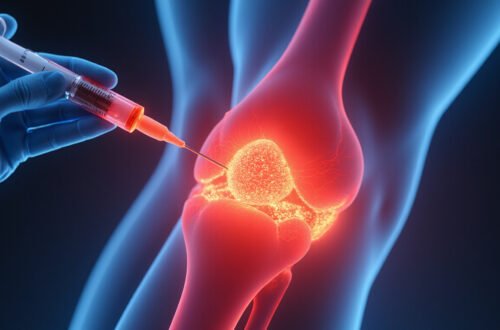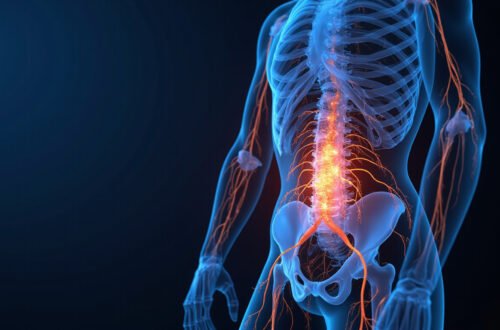Buttock pain is a common issue that can affect anyone, regardless of age or activity level.
It can range from a mild discomfort to sharp, debilitating pain, often impacting daily activities and overall quality of life.
Understanding the causes and symptoms of buttock pain, as well as effective ways to relieve it, is essential for anyone experiencing this discomfort.
In this ultimate guide, we will delve into the various aspects of buttock pain, exploring its common causes, self-care strategies, treatment options, and preventative measures to help you stay active and healthy.
Your Sciatica Pain-Free Future Starts Here – Click to Learn More!
Key Takeaways
- Buttock pain can arise from various causes including muscle strain and nerve compression.
- Common conditions linked to buttock pain include sciatica, piriformis syndrome, and herniated discs.
- Self-care strategies like stretching, applying heat, and over-the-counter pain relievers can effectively reduce buttock pain.
- It’s important to consult a healthcare provider when buttock pain is severe, persistent, or accompanied by other symptoms.
- Preventive measures such as regular exercise and maintaining good posture can help protect against buttock pain.
1. Introduction to Buttock Pain: Causes and Symptoms
Buttock pain is a common issue that many individuals experience at some point in their lives.
This discomfort can be caused by a variety of factors, ranging from muscular strains to more severe conditions like sciatica or herniated discs.
Symptoms of buttock pain may include a dull ache, sharp shooting pains, or even numbness that radiates down the legs.
Understanding the potential causes of your buttock pain is essential for effective treatment and management.
Whether it arises from prolonged sitting, physical activity, or underlying medical conditions, identifying the source is the first step toward finding relief and improving your overall quality of life.
2. Common Conditions Associated with Buttock Pain
Buttock pain can be a nuisance, affecting daily activities and overall quality of life.
There are several common conditions that can lead to buttock pain, and understanding these can help in identifying the right treatment.
One prevalent cause is sciatic nerve irritation, often due to a herniated disc or spinal stenosis, resulting in sharp, shooting pain that can extend down the leg.
Another frequent culprit is piriformis syndrome, where the piriformis muscle compresses the sciatic nerve, leading to significant discomfort in the buttocks and radiating pain.
Additionally, tendonitis or bursitis in the hip region can contribute to localized buttock pain, often exacerbated by specific movements or prolonged sitting.
Lastly, injuries or strain from overuse during physical activities, such as running or weightlifting, can also manifest as buttock pain.
Recognizing these conditions early on can pave the way for effective treatment strategies, ensuring you regain comfort and mobility.
‘Pain is inevitable. Suffering is optional.’ – Haruki Murakami
3. Self-Care and Home Remedies for Buttock Pain Relief
When it comes to tackling buttock pain, self-care and home remedies can be incredibly effective solutions.
First and foremost, applying heat or ice packs to the affected area may provide quick relief.
Heat helps to increase blood flow, while ice can reduce inflammation.
Stretching exercises targeting the gluteal muscles, like the seated figure-four stretch, can also alleviate discomfort by promoting flexibility.
Moreover, practicing good posture while sitting and standing can prevent undue stress on your back and hips, which often contributes to buttock pain.
Finally, consider incorporating anti-inflammatory foods into your diet, such as turmeric and ginger, to help manage pain from within.
By taking these simple steps, you can empower yourself to find relief and improve your overall well-being.
Your Sciatica Pain-Free Future Starts Here – Click to Learn More!
4. When to Seek Professional Help for Buttock Pain
Buttock pain can often be managed with simple home exercises and lifestyle adjustments.
However, it’s crucial to know when to seek professional help.
If your buttock pain is persistent, worsening, or accompanied by other symptoms such as numbness, tingling, weakness in the legs, or significant discomfort that disrupts daily activities, it may be time to consult a healthcare professional.
Additionally, if the pain arises after an injury or is associated with a fever or unexplained weight loss, these could be signs of a more serious condition.
In such cases, an evaluation by a physician or a physical therapist can help pinpoint the underlying cause of your discomfort and guide you toward an effective treatment plan.
5. Treatment Options: Physical Therapy, Medication, and More
Buttock pain can be a debilitating condition that affects your daily life, but fortunately, there are various treatment options available.
Physical therapy stands out as one of the most effective methods for addressing the underlying causes of buttock pain.
A physical therapist can design a personalized exercise program to strengthen the muscles in your hips and lower back, which can alleviate discomfort and improve mobility.
Alongside physical therapy, medication such as nonsteroidal anti-inflammatory drugs (NSAIDs) can help reduce pain and inflammation.
In more severe cases, your doctor might suggest corticosteroid injections to target inflammation directly.
Other treatments like chiropractic care or acupuncture have been reported to offer relief as well.
It’s essential to consult with a healthcare professional to determine the most suitable treatment plan tailored to your specific needs, helping you return to a pain-free lifestyle.
FAQs
What are the common causes of buttock pain?
Buttock pain can stem from various causes including muscle strains, sciatica, tendonitis, herniated discs, and conditions like piriformis syndrome.
Identifying the underlying cause is crucial for effective treatment.
When should I seek professional help for my buttock pain?
You should consult a healthcare professional if your buttock pain persists for more than a few weeks, is accompanied by numbness or weakness in the legs, or worsens with activity.
What are some effective home remedies for relieving buttock pain?
Home remedies for buttock pain relief include applying ice or heat, stretching exercises, over-the-counter pain relievers, and maintaining good posture.
These methods can help alleviate mild discomfort.
Can physical therapy help with buttock pain?
Yes, physical therapy can be an effective treatment for buttock pain as it involves tailored exercises to strengthen muscles, improve flexibility, and alleviate pain through guided movements.
What preventive measures can I take to avoid buttock pain?
Preventive measures include regular exercise, maintaining a healthy weight, practicing good posture, and warming up properly before physical activities to keep your hips and buttocks healthy.






